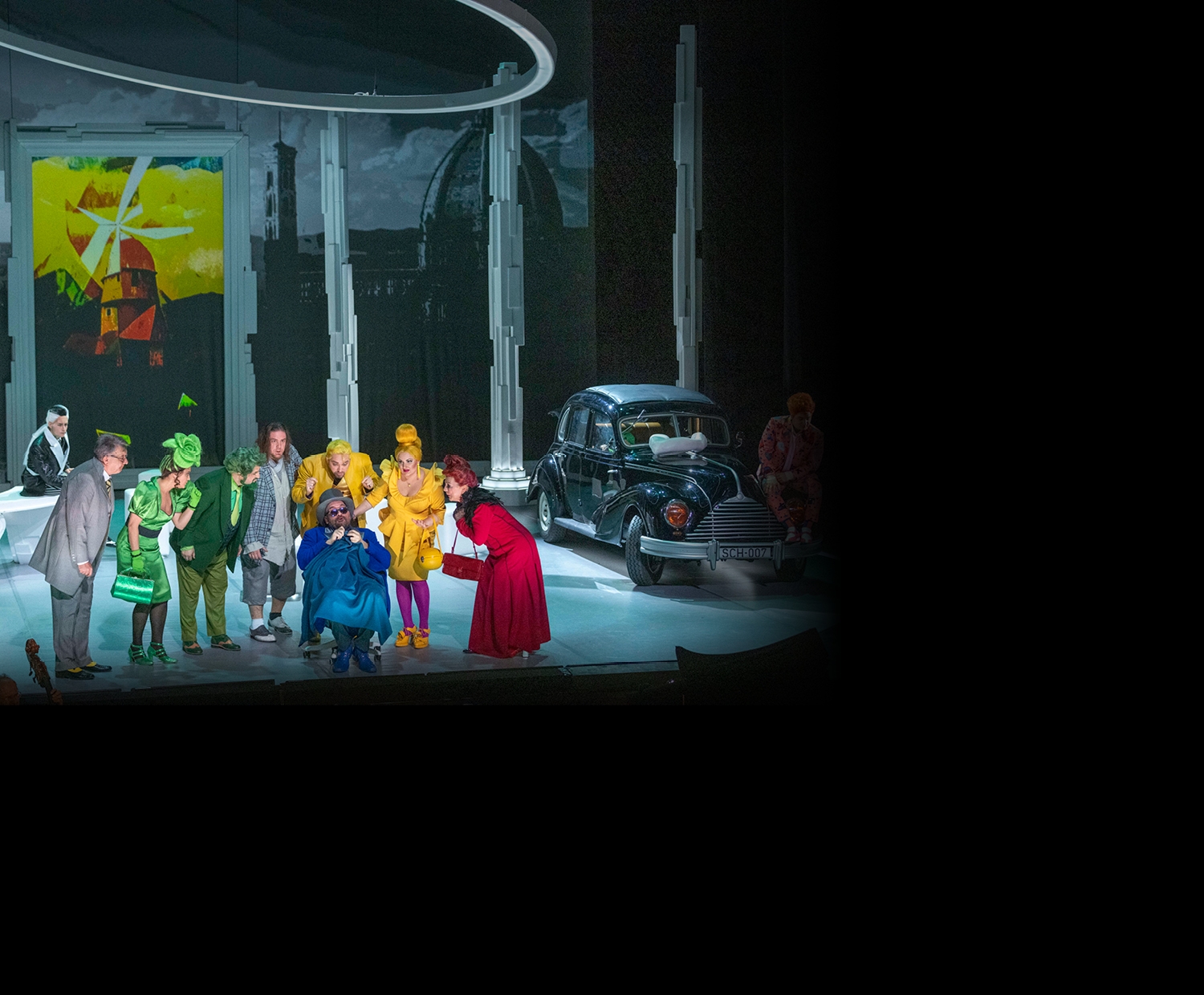
Schicchi 2.0
Details
In Brief
We can safely say that Gianni Schicchi is one of the most entertaining comic works of opera literature, which stands out even in the opera oeuvre of Giacomo Puccini with its wittiness. Ingenious moments chase one another both in the vocal and orchestral parts, and also through the text and the incredibly funny situations. Not many works dare to apply the black, nay morbid humour that allows the comical family intrigues enfold right next to the deathbed of a relative.
Parental guidance
Events
Premiere: Dec. 7, 2022
Synopsis
The body of the recently deceased wealthy nobleman Buoso Donati lies on the deathbed surrounded by relatives there to angle for his inheritance. They have good reason to worry, and not just because they are a big family: there are rumours going around a northern village, Signa, that Buoso has left his entire estate to a monastery. They turn over the entire house in search of his will. The document is found at last by the young Rinuccio, who makes his Aunt Zita promise him that if there is enough money for the family, he can marry his love, Lauretta. As it turns out, the gossip is true: Buoso Donati has left all of his money to the monks. Rinuccio counsels the despairing relations to seek the help of Lauretta's father, Gianni Schicchi, the low-born man who has nevertheless prospered from his own wits.
Schicchi arrives with his daughter. Meeting, however, with arrogance, disdain and antipathy from the noble family, he is about to depart when his daughter speaks directly to his heart: she will die if she can't marry Rinuccio! Schicchi agrees to the game to please Laura. Suddenly Doctor Spinelloccio knocks on the door: he is there to examine the extremely ill Donati. Imitating the deceased Buoso, Schicchi assures the doctor that he is better now. Schicchi sends the relatives to summon the notary, and then wearing Donati's clothes proceeds to dictate his final will and testament. The relatives each try to bribe Schicchi to favour them over the other relatives when it comes to the best of the inheritance: the mule, the Donati residence in Florence, and the mill in Signa and Schicchi nods at each of them, reminding them separately that they must forever remain silent about the ruse, or they'll be punished by the law for fraud.
The notary arrives with two witnesses, and Schicchi dictates his will, but to everyone's mute astonishment, leaves the mule, Donati's house, and the mill to himself, Gianni Schicchi! The family rages, but they cannot say a word lest the deception be discovered. When the notary departs, they furiously steal what they can, but Schicchi ejects them from the house and looks touched at the happy couple, Rinuccio and Lauretta.
Media
Reviews
"Attila Toronykőy's staging exploits the black humour inherent in the text spectacularly. (…) The greatest merit of the dynamic performance is that being placed in a modern environment, Puccini’s one-act becomes accessible and relevant for teenagers as well, thus achieving the most important goal of the series successfully."
Zoltán Péter, Operaportál
Opera guide
Introduction
“...Here is the madman, Gianni Schicchi [...] / And he satisfied his desire / by taking on another man’s form, [...] the likeness of the deceased Buoso Donati, / so that he might make the will himself” – thus does Dante sketch a tragic fate in Inferno, Canto 30 (in the translation of Mihály Babits). Puccini’s comic opera is a masterpiece from several perspectives: the relationship between its sparkling music and its lively text is particularly felicitous (in the words of Ashbrook, “its score adapts to every detail like quicksilver”), while at the same time the humour of the music is obvious even without the text, since the traditional stock-in-trade of commedia dell’arte melds in a particularly healthy way with the characters of the piece. The subtle network of repetitions further reinforces the unity of the opera buffa characters. Not to mention that Puccini proves himself a brilliant parodist. To this we might add the ethical transformation as well, by which Dante’s severe judgment is overturned in favour of human ingenuity and comic frailty.
Schicchi is not merely a resourceful forger blessed with theatrical gifts; he is also the catalyst for Lauretta and Rinuccio’s “deadly” love, and for his own fortune besides. A certain culpability in this amorous aid lies with one of the most beautiful operatic melodies ever written: namely Lauretta’s aria (O mio babbino caro). In Schicchi we see a new social stratum slipping into an old skin, even as everything is already speaking of the life-affirmation of Florence at the dawn of the Renaissance. Paradoxically, the opera’s tableau- and painting-like qualities are as striking as the sweeping momentum born of the situation. It is as though we had stepped into the burlesque plot of a swiftly moving, endlessly humorous film. The mourning ritual, the customary rite, gradually shifts from hypocrisy into apocalyptic chaos, only to discover a new principle of order in enforced, inventive complicity. Normative behaviour and the observance of rules smooth the way for the success of the prank as well: spontaneity (whether of love or of the relatives’ rage) must be confined within these boundaries. The variety of linguistic registers – quotations from legal statutes, the Latin of testament-making, the spontaneous speech of love and anger, the language of poetic vision – raises the work into the ranks of the most energetic satires. Particularly interesting is the protection of Lauretta’s innocence: during the crime Schicchi keeps her constantly removed, for instance sending her onto the balcony to feed the birds. Undeniably, the opera also plays with the erotic connotation of the Italian word for “bird,” and yet the idyllic world of Lauretta and Rinuccio’s love nevertheless represents a separate island within the sea of “sin.” Upon this “innocent” island something hopeful and new is destined to be built: a new city, a new sense of life.
Zoltán Csehy
The director’s concept
Set in Florence, though by no means in Dante’s time, this is a new staging of one of Puccini’s most popular operas. The production’s director, Attila Toronykőy – backed by several decades of experience – knows and senses well what can make the story, immortalized in the La Divina Commedia, exciting for young audiences. “I’ve always been bothered in modernized opera productions when, around Buoso Donati’s deathbed, the inheritance-hungry relatives start squabbling over a mule and the Signa mill,” the director says. “Real estate, money, material possessions are one thing, but what today could carry the same weight as a draught animal and a mill once did?” This is the starting point of the staging, and since Schicchi 2.0 is aimed at students, what is seen and heard on stage must be made appealing to them. It is important to bring the play as close as possible to the audience, which in this case literally happens thanks to a special spatial arrangement. The director believes in the educational power of theatre: the visual arts references and Renaissance-inspired sets serve to enrich young viewers’ visual culture.
In this interpretation, the wealthy Buoso Donati is known above all for his fat wallet. The environment he inhabits evokes the world of the Middle Ages and the Renaissance, but at the same time is recognizably contemporary. The “modernization” of the mule and the mill gives rise to unusual, novel stage solutions. A man like this Donati invests his money in far more tangible and spectacular assets. Exactly what those are will be revealed in the performance, but the relatives’ desperate motivation also becomes more understandable: the creators sought objects for which many today would be willing to do almost anything. The director prefers to establish clear relationships on stage, and so whereas in Puccini Donati is already dead when the relatives appear, in the new production he is still alive. This, however, upends the dramaturgy, since the dressing and bed-laying of the corpse – which often provides the most humorous moments in Gianni Schicchi – had to be rethought. Thus, for instance, instead of in his bed, Buoso Donati dictates his will from behind his enormous desk.
